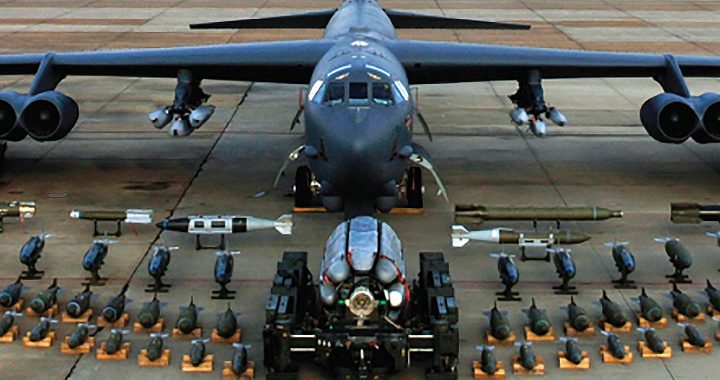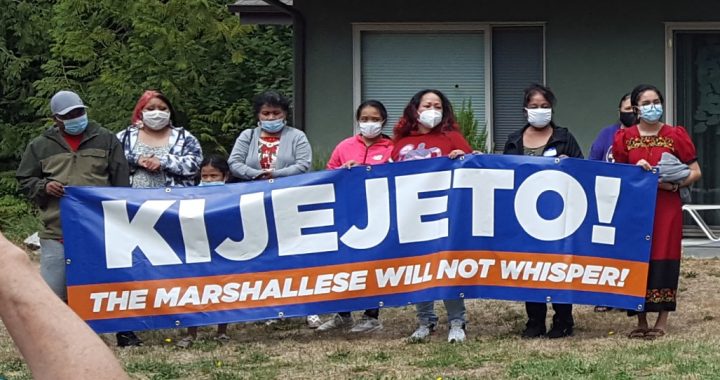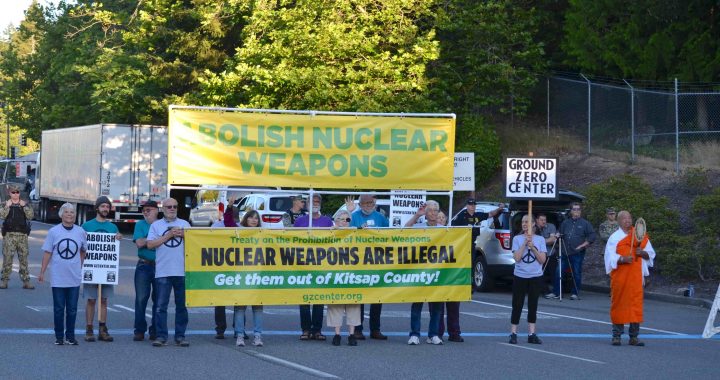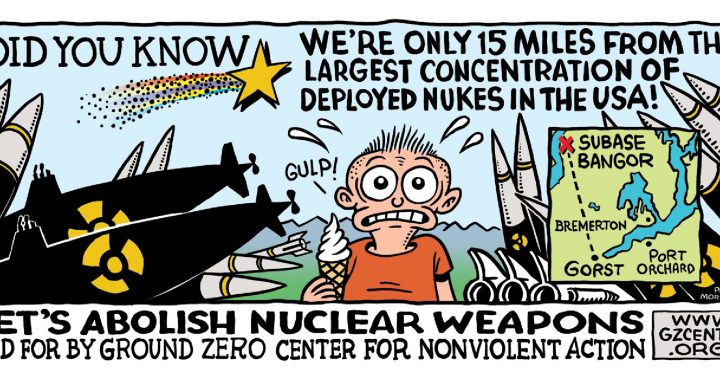The draft 2018 Nuclear Posture Review (NPR) was leaked earlier this month. A new NPR is issued every four years, and essentially paves the way for our nation’s continuing reliance on nuclear weapons. Presidents have used the NPR to implement their individual nuclear weapons agendas, and in the case of President Trump, we’re talking about a guy who seems to want a lot more nukes. Although much of what the 2018 draft NPR says is not particularly groundbreaking, it makes at least one very troubling (and downright wacky) recommendation. Read on to learn more.
MINI-NUKES ON TRIDENT???
The 2018 draft NPR drops quite the bombshell (no pun intended) when it calls for essentially changing up the mission of the nation’s ballistic missile submarines (in a dangerous way).
“…in the near-term, the United States will modify a small number of existing SLBM [Trident] warheads to provide a low-yield option…”
One argument for this approach (in the 2018 draft NPR) is that the U.S. “will not require or rely on host nation support to provide deterrent effect.” This would appear to be a way to hedge our bets against other nations currently hosting our tactical nuclear weapons, in case they change their minds and tell us to remove them.
Arming a “strategic” weapon like the Trident II D5 submarine-launched ballistic missile is an extremely dangerous recommendation. Currently, the D5 missile carries either (or both) the W76 (100 kiloton yield) or W88 (475 kiloton yield) thermonuclear-armed warhead. Either one is a dramatic contrast to a low-yield (likely no more than 10 kiloton) “tactical” warhead.
In a time of crisis, an adversary would not be able to distinguish the different incoming warheads, although they could detect a launch and know it was launched from a submarine. A nation under attack by warheads from any D5 missile, would have to assume the worst case scenario – a full-scale attack – and that would likely trigger full-scale (nuclear) retaliation.
It is mind-boggling that this idea ended up in the 2018 draft NPR. I would expect nuclear weapons experts to be shaking their heads and asking if the person, or persons, who came up with this idea came from a psychiatric ward.
HOW MANY SUBMARINES?
The 2018 draft NPR says that, “The COLUMBIA program will deliver a minimum of 12 SSBNs to replace the current OHIO fleet and is designed to provide required deterrence capabilities for decades.
This is clearly paving the way to build more than the 12 submarines called for in the current plan, and that would be nothing more than a make-work program for the weapons makers. Some experts, such as Plowshares Fund’s Joe Cirincione, have called for fewer than 12 New Tridents.
As Cirincione says, “If you just need this to be a deterrent force, to respond in case someone is crazy enough to actually attack the United States and thereby deter them from ever doing that, well, you really could be talking about four, five, six nuclear submarines, each of which would have 16 missile tubes, each of which would carry five or six warheads. That’s a lot of nuclear weapons.”
Of course, if even one of those Trident submarines launched all of its nuclear-armed missiles, that would be way more than enough nuclear firepower – in addition to the immediate and near-term deaths – to cause billions of deaths due to famine caused by the effects on agriculture and food supplies.
A NEW MISSILE? OF COURSE!
The 2018 draft NPR confirms what many already know – the Navy, in addition to building a new submarine, is also planning on “the timely replacement of the D5 SLBM.” The current D5 missile is undergoing what the government calls a “life extension” that will allow it to be deployed until 2042. The Navy plans to begin studies in 2020 on a replacement that will be viable for the life of New Trident.
TRIDENT: THE CROWN JEWEL
The 2018 draft NPR continues to tout Trident as “the most survivable leg of the Triad” – the Triad being ballistic missile submarines, land-based missiles, and bombers. Under the U.S.-Russia New START treaty signed in 2010, roughly 70-percent of U.S. nuclear warheads either are or will be deployed on Trident.
It also states that Trident is “at present, virtually undetectable, and there are no known, near-term credible threats to the survivability of the SSBN force.” And while saying that the U.S. will “hedge against the possibility” of advances in anti-submarine warfare that could threaten Trident in the future,” the draft NPR demonstrates some concern about how this could affect the “survivability” of Trident in the future.
“In coming decades, advances in adversary anti-submarine warfare and missile defense capabilities could challenge the effectiveness of current SSBN and SLBM systems.” The British American Security Information Council has researched and written extensively on the risks posed to Trident by rapidly emerging technologies, including unmanned underwater vehicles (UUVs) and hacking. Trident is, by no means, invulnerable to future threats.
Essentially, the NPR is saying that the Navy is preparing to build a new generation of ballistic missile submarines based on today’s threats. With today’s rapid advances in technology, it is highly likely that New Trident will face vulnerabilities right out of the starting gate, and that those threats will continually evolve.
THE UPSHOT
Aside from the impacts on Trident, the draft 2018 NPR clearly demonstrates that the U.S. government is dead set on perpetuating the Doomsday Machine (the title of Daniel Ellsberg’s new book). It is set to pour billions of taxpayer dollars into what is essentially the machinery of our nuclear extinction. It is the continuation of over seven decades of such preparation.
There is, of course, no meaningful discussion of the use of diplomacy and conflict resolution, nor is there any mention of our obligations toward disarmament stemming from our participation in the Non-Proliferation Treaty. But we shouldn’t expect any of that in a document that is only intended to promote our nation’s continued reliance on nuclear weapons as the ultimate tools of foreign policy.
At very least, we need to raise the alarm about the 2018 draft NPR and its potential consequences. At a time of great geopolitical instability, we cannot be creating new controversy and building tensions. This NPR, with its mad talk of deploying low-yield warheads on Trident, serves to further destabilize already delicate and deteriorating relations with Russia, and possibly other nuclear-armed nations.
I trust we can use this new NPR to generate a public dialogue on just why we need to (or need not) continue the same course as the last (nearly) quarter century. The NPR uses fear as its driving force, citing the dangers posed by Russia (and China, among others), and yet it is the U.S. and Russia that must lead the world away from the false security of nuclear weapons. We keep driving each other deeper into the nuclear abyss, and at some point one or the other has to reach out a hand and say “ENOUGH!” There is no security in nuclear weapons, and they should, therefore, have no place in U.S. national security strategy.
BRINGING US BACK FROM THE BRINK
Physicians for Social Responsibility has come together with other organizations to ask the United States to make nuclear disarmament the centerpiece of national security policy. In a joint resolution – Back from the Brink: A Call to Prevent Nuclear War – the groups call on the United States to lead a global effort to prevent nuclear war by:
- renouncing the option of using nuclear weapons first
- ending the president’s sole, unchecked authority to launch a nuclear attack
- taking US nuclear weapons off hair-trigger alert
- canceling the plan to replace its entire arsenal with enhanced weapons;
- actively pursuing a verifiable agreement among nuclear armed states to eliminate their nuclear arsenals.
Ground Zero Center for Nonviolent Action has endorsed the resolution and, if you are a part of any organization – civic group, professional association, faith community, university, or municipality – we invite you to become an endorser too. Help us build a groundswell for abolition. Future generations depend on us!




